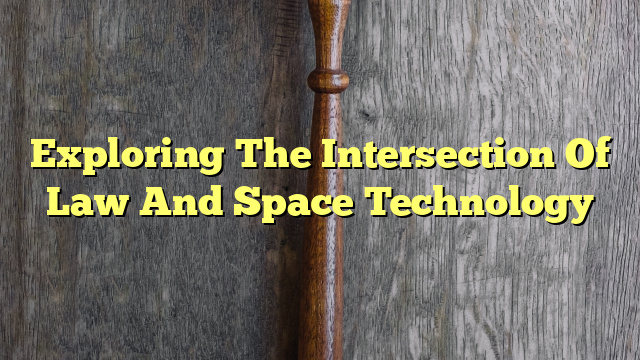Table of Contents
- Introduction
- Law and Computer Science
- Space Law
- Intersection of Law and Space Technology
- When Might a Space Lawyer Be Useful?
- Conclusion
Introduction
The intersection of law and space technology is an increasingly important and fascinating field. In the last few decades, space exploration has grown significantly, advancing our understanding of the universe. As space technologies become ever more sophisticated and our presence in space expands, the need for legal guidance and support grows too.
Law and Computer Science
Computer science and law have been intertwined throughout history. As early as the 1950s, computer scientists used legal principles to define the scope of computer systems and to ensure the security of data. In the 1990s, computer scientists and lawyers started to collaborate in developing digital contracts, which had the potential to revolutionize the way legal documents were drafted, managed, and tracked.
Today, computer science and law continue to intersect in a variety of areas. For example, computer scientists and lawyers are exploring the use of artificial intelligence (AI) to automate contract formulation and dispute resolution. In the area of cybersecurity, computer scientists and lawyers are working together to develop legal frameworks to protect users’ data from malicious actors.
Space Law
Space law is a field of international law that governs the use of outer space and the activities that can take place there. It is a relatively new field, but it is growing rapidly as more countries become involved in space exploration. Space law is concerned with a variety of topics, including satellite communications, space debris, and the use of space for military purposes.
The international community has been working to develop a comprehensive set of rules and regulations to govern space activities, and a series of international agreements have been negotiated over the years. The most important of these is the Outer Space Treaty of 1967, which established the framework for the exploration and peaceful use of outer space.
Intersection of Law and Space Technology
As space technologies become ever more sophisticated and our presence in space expands, the intersection of law and space technology is becoming increasingly important. As the number of countries with a space presence grows, so too does the need for legal guidance concerning the use of space and the various activities that can take place there.
Space lawyers must be knowledgeable not only about space law but also about the various space technologies that are being developed and used. They must be able to interpret the international treaties and laws that govern space activities and be able to advise their clients on how best to comply with them.
One area in which space lawyers are particularly important is in the negotiation of international agreements between nations regarding the use of space. Space lawyers must be knowledgeable about the legal and technical aspects of space exploration and be able to advise their clients on the best way to negotiate such agreements.
When Might a Space Lawyer Be Useful?
A space lawyer might be useful in a variety of situations. For example, they could advise a company or government on the best way to negotiate an international agreement regarding the use of space. They could also advise a company or government on the best way to comply with the various laws and regulations that govern space activities.
Space lawyers could also be useful in disputes between countries or companies regarding the use of space. In such cases, a space lawyer could provide invaluable legal advice on the best way to resolve the dispute and ensure that all parties are in compliance with the applicable laws and regulations.
Conclusion
The intersection of law and space technology has become increasingly important as space exploration grows. Space lawyers are an invaluable resource in providing legal advice and support on the various issues that arise when exploring and using space. As space

